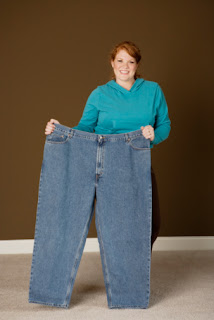To see Kathryn Naphy, you’d think she’s been thin and eating healthy, balanced meals all her life. But, the 33-year-old mom of two has a story behind what you see today.
“In 2006, I was diagnosed with pre-diabetes, my cholesterol was about 350 and my triglycerides were in the thousands,” remembers Kathryn. “I was only 26, a new mom and I was scared I wouldn’t be around to see my son grow up.”
Though Kathryn had been active her whole life, her weight had always been a struggle for her. Even while eating well and playing sports, she remained about 30 pounds overweight.
“After I had my first child, I hit my highest weight - about 240 pounds,” she remembers. “That, combined with learning about my health problems was a wake up call for me.”
Making the Weight-Loss Surgery Decision
 Kathryn’s aunt had Roux-en-Y (gastric bypass) surgery with Penn bariatric surgeon Matt Kirkland, MD, and successfully lost weight – and gained her life back.
Kathryn’s aunt had Roux-en-Y (gastric bypass) surgery with Penn bariatric surgeon Matt Kirkland, MD, and successfully lost weight – and gained her life back. “Seeing my aunt’s success made me realize weight-loss surgery might be a tool I could use to get healthy again,” says Kathryn. “My aunt paved the way for me, and everyone in my family was supportive of my decision.”
Kathryn met with Dr. Kirkland to learn about her weight-loss surgery options at Penn.
“I knew gastric bypass was the surgery that would save my life.”
Kathryn fulfilled the necessary testing and nutrition requirements, and had her surgery
On July 5, 2006. Everything went smoothly.
“The biggest challenge was immediately after surgery,” remembers Kathryn. “It was difficult to lift my son in and out of the bathtub while I was recovering, but aside from that, my recovery was fairly easy.”
It wasn’t long before Kathryn lost more than 100 pounds going from her pre-surgery weight of 224 to 119 pounds.
“I was surprised at how fast the weight just came off,” she says. “In fact, I had to make a conscious effort to stop losing weight because I was getting so thin.”
Kathryn worked with Penn dietitians to maintain an eating program that would help her maintain her weight at about 130 pounds.
Pregnancy After Gastric Bypass Surgery
And then in 2009, she got pregnant with her second child. This pregnancy, she says, was a bit different than her first.“I didn’t eat poorly like I did with my first pregnancy,” she says. “And I only gained 35 pounds. Overall, this pregnancy was easier because I wasn’t carrying all of that extra weight around.”
Kathryn breastfed and got back on track after she gave birth, and returned to her pre-pregnancy body in no time.
Today, Kathryn blogs about her weight-loss journey, and what it’s like to be a mom of two who’s had gastric bypass surgery.
She has also led by example, and changed the way her entire family eats by cooking fresh meals prepared with fruits, vegetables, lean meats and whole grains.
“I still eat small meals, five or six times a day,” she says. “Weight-loss surgery at Penn was the tool I needed to change my life and turn my health around for good.”
Connect with Kathryn on her blog, Eating After Gastric Bypass, or follow her on Twitter.
Lose Weight at Penn Medicine
Penn can help you lose weight.Learn about medical weight loss in Philadelphia, and the Penn Bariatric and Metabolic Surgery Program at a free information session about weight-loss surgery in Philadelphia.
There, you will hear about your weight-loss surgery options, and how Penn can help you lose weight and get healthy for good.
Register for a free information session today.














